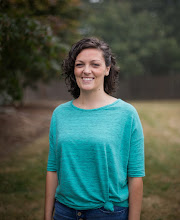I have a dear friend going through what might easily be labeled as a "tough time." This uniquely difficult time began in May, though I'm sure she would tell you much of it has been building for a while. She's quick to explain that her family has been through this kind of thing before. They survived, and she's hoping they will survive this time too. In fact, she is eager not to simply survive this hardship, but to thrive in it and is willing to do whatever it takes to come out on the other side of this suffering better off, more stable, more in-line with Jesus, trusting fully that He will deliver them.
Today, she went to a special time of deliverance, so I have been praying for her throughout the day and especially during her meeting. I have also been thinking. She is right to seek deliverance, though I have not been privy to the details of exactly what she is asking or what this prayer time will be like. I have asked God to deliver them from this hardship, to deliver their family from sins that easily ensnare, and it has got me in a state of serious contemplation. I keep wondering: what does she want to be delivered from? What does she think she needs delivered from? What do I think I need delivered from?
As Christians, we have been delivered from the worst possible event coming for any human being: punishment for our sins in eternal separation from God. Not only that, we have actually been delivered from currently being a slave to sin as well! We have been delivered from the domain of darkness and brought us into His glorious kingdom. He continues to delivers us from fear, from many forms of evil, and from the burden of needing to adhere to the Law in order to become righteous (Psalm 34:4, 17; Colossians 1:13; Romans 8:2).
But when I think about praying for deliverance, these are not really the first things that come to my mind. I think about being delivered from our rental home, where our landlord only takes care of the ongoing problems when we receive a piece of mail he wants to get. I think of being delivered from a state of neediness, or relying on my husband for a variety of things. My heart wants to be free from the obligations at home, like cleaning or cooking or driving people places. I want to be delivered from my middle-class life into a higher class, where money will not prevent me from obtaining the home I want, going on the vacations I want, or letting my kids be in all the activities they want.
In a sense, I want to be delivered from the world, but also to gain things in the world, and the way I want that to happen is in reality an idol.
So as my friend was in the midst of her time to pray and seek deliverance, all I could think to ask God was that He would help her see the root of what she needs deliverance from and truly desire to be free from it. I began to see that I need deliverance from a lot of things that God has already freed me from, but I have chosen to become a slave to them. However, I can choose again to grab hold of the deliverance God offers.
I can choose to rely on Him and be free from worry over provision.
I can choose to trust God to provide through my husband and not worry over how that will come about.
I can choose to rely on my landlord, knowing full well that if we need something, God is more than capable of giving it to us.
I can choose to submit to responsibilities without begrudging what those tasks might take away from me, having faith that what God needs me to do will get done, and understanding that what I want to get done is not always what is best for me.
I can choose to be content with my home and my financial status, knowing that being delivered from them on the earth does not guarantee any eternal or spiritual gain, but that my current status is yet another avenue prompting me to trust in God alone.
I can choose to look at what I have been delivered from with gratitude and awe, knowing it will always be enough.
And isn't that what Christmas is supposed to be about, seeing the beauty and the gift of Jesus coming to be our Savior? We need to see Him and recognize the great gift of deliverance He offers. He submitted to a life of lowness in order to give us the highest status possible: children of the King!
In my mind (and hopefully my heart), I want to be delivered from every possible snare. So, I will continue to pray for my friend, along with myself, and many others in my daily life. We all need deliverance, and my prayer is that we will see and treasure the deliverance that is already in our grasp, that we would be eager to revel and glory in it, and that it would spur us on to keep asking for more deliverance. Deliverance from self, from selfish desires, from selfish motives, and worldly want. If I look at all that Christ has delivered me from and it does not bring me some level of peace, satisfaction, or love, then it is clear that my desire is not for Him, but for self. And being delivered from that level of self-love, the kind that prevents me from enjoying the life in front of me to its fullness, is a prison of the cruelest kind.
Praise God that He is eager to deliver!













